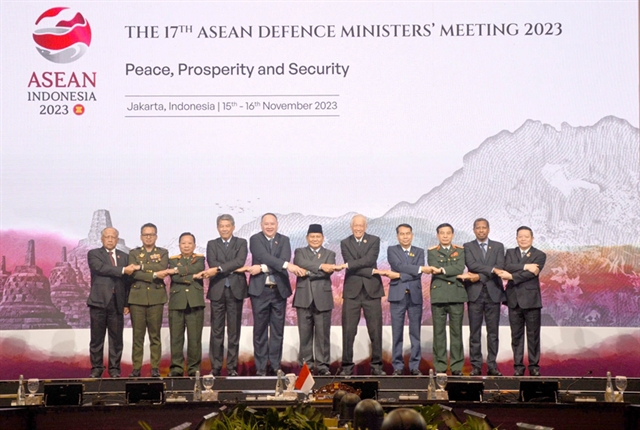 Politics & Law
Politics & Law

 |
| Vietnamese Minister of Defence, General Phan Văn Giang (third from right) along with other heads of delegations at the 17th ASEAN Defence Ministers' Meeting held Wednesday in Jakarta, Indonesia. |
JAKARTA — The 17th ASEAN Defence Ministers' Meeting (ADMM) took place in Jakarta, Indonesia on Wednesday, culminating in the adoption of the Jakarta Joint Declaration for Peace, Prosperity and Security.
A Vietnamese delegation led by Politburo member, Vice Secretary of the Central Military Commission and Minister of National Defence Gen. Phan Văn Giang attended the event, proactively contributing to its success.
After approving the agenda, the meeting listened to the ASEAN Secretary-General Kao Kim Hourn’s update on the recent developments in ASEAN, and passed the guidelines for the implementation of the observer mechanism for Timor-Leste in the ADMM, ADMM+ and related meetings.
Delegates heard a report on the outcomes of the ASEAN Defence Senior Officials' Meeting and adopted a number of key concept papers, including the ADMM Work Programme 2023-2026, the Implementation of the ASEAN Outlook on the Indo-Pacific and the Harmonising ADMM and ADMM+ Initiatives. They also took note of a discussion paper on the use of military assets to maintain food security in the region.
The head delegates approved the draft amendments to the Standard Operating Procedures of ASEAN - Our Eyes Initiative, evaluation of the current cycle of ADMM+ Experts’ Working Groups, and the Concept Paper on the US-ASEAN rising defence leaders’ programme.
The meeting approved the Jakarta Declaration for Peace, Prosperity and Security, which recognises security threats, geopolitical shifts, and the impact of competition among major powers that may affect ASEAN.
The declaration emphasises the importance of adhering to the United Nations Charter, the ASEAN Charter, the Treaty of Amity and Cooperation in Southeast Asia (TAC), the Bali Process, as well as international law, maintaining peace, prosperity and security in the region.
The document also underscores the importance of maintaining peace, stability and safety in the region and freedom of navigation and overflight in the East Sea (known internationally as the South China Sea), pursuing peaceful means to settle disputes in accordance with international law, including the 1982 United Nations Convention on the Law of the Sea (UNCLOS). It called for exercising self-restraint and avoiding activities that could complicate or escalate tensions affecting peace and stability.
Additionally, it urges the early conclusion of an effective, practical and legally binding Code of Conduct in the East Sea (COC) that is in line with international law, including UNCLOS 1982, while implementing fully and effectively the Declaration on the Conduct of Parties in the East Sea (DOC).
It also welcomes current trust building measures such as the Code for Unplanned Encounters at Sea (CUES), the Guidelines for Air Military Encounters, the Guidelines for Maritime Interaction, the ASEAN Direct Communications Infrastructure, and activities within the DOC framework. — VNS




